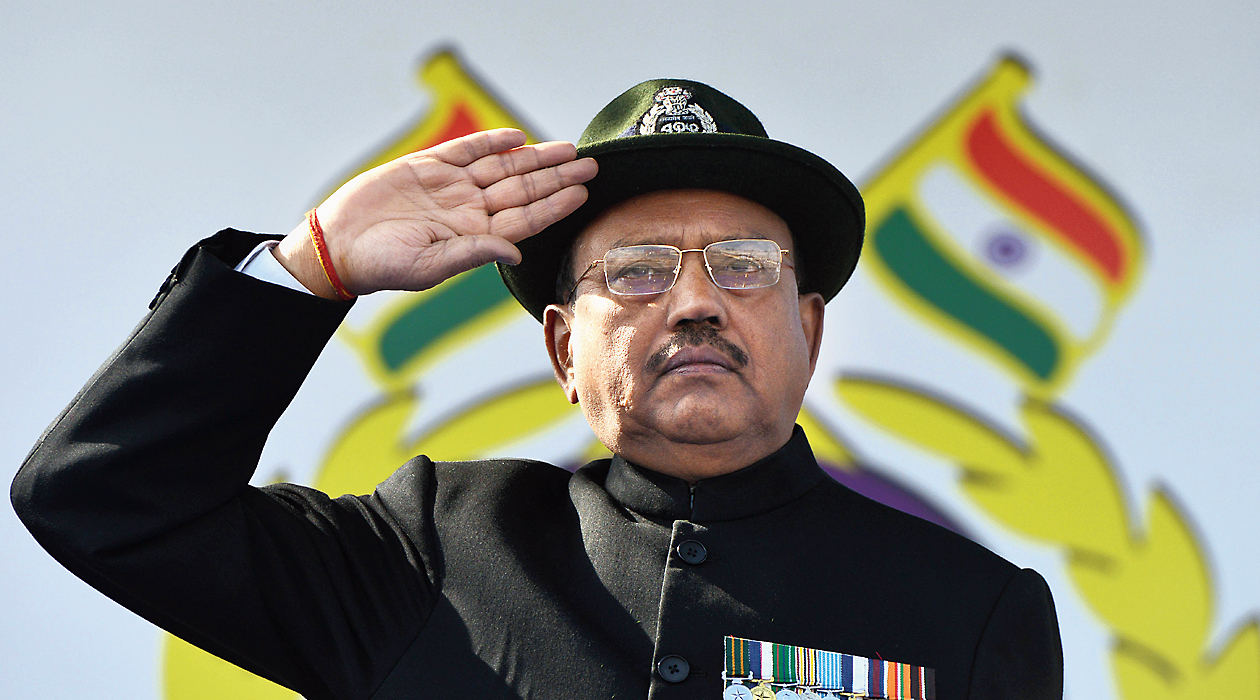Ajit Doval has become the first national security adviser in India to be granted a fresh term, and his rank has been upgraded to that of a cabinet minister.
Doval, a retired IPS officer who had the rank of a minister of state in his first term as the national security boss, will now be on a par with external affairs minister S. Jaishankar and other cabinet ministers.
An order from the department of personnel, dated June 2, said: “The Appointments Committee of the Cabinet has approved his appointment as NSA with effect from May 31, 2019. His appointment will be co-terminus with the term of the Prime Minister. During the term of his office, he will be assigned the rank of Cabinet minister in the Table of Precedence.”
The extension and elevation immediately prompted some officials to try and read the tea leaves to figure out the implications for the foreign policy establishment that, of late, has been yoked to the security apparatus.
As usual, the interpretations swung from one extreme to the other, ranging from shrunken leeway to a reward for his performance over the past five years.
One official said Doval’s promotion could be linked to Jaishankar’s appointment as foreign minister. As foreign secretary, Jaishankar had reported to the NSA, while the foreign ministry was said to have been directly controlled by the PMO, Doval being the interface.
The elevation of Jaishankar, a seasoned diplomat who is considered no pushover, as foreign minister was the biggest surprise of Modi’s second innings. “Doval’s elevation could also be an attempt to ensure he gets parity with Jaishankar. Both hold very important portfolios in the government and know well that they have to respect each other’s turf,” the official said.
Doval’s rise will also enable the NSA to push through work without getting entangled in red tape, the official added.
But other officials said that the NSA, considered a close confidant of Prime Minister Narendra Modi and who had virtually called the shots in the earlier home ministry led by Rajnath Singh, is unlikely to have the same freedom now.
“With home minister Amit Shah the virtual No. 2 (in the Modi government), Doval will have to take decisions on the security front in consultation with him,” a Union home ministry official said.
The official said that during Modi’s first term, Doval had emerged as a power centre in the Prime Minister’s Office and took all key decisions pertaining to Jammu and Kashmir and internal security.
That had led to a perception within the bureaucracy that Doval’s proximity to Modi had virtually left Rajnath the government’s second-in-command only on paper.
Now the power dynamics have changed, the official added.
But a third official said Doval had been rewarded for his performance over the past five years. “His reappointment as NSA for the next five years and subsequent promotion shows the Prime Minister’s unflinching faith in him,” the official told The Telegraph.
Earlier this year, the Opposition had blamed Doval for the intelligence failure that led to the February 14 Pulwama terror attack. A Jaish-e-Mohammed suicide bomber had rammed his explosive-packed car into a paramilitary convoy on the Srinagar-Jammu highway, leaving 40 CRPF personnel dead.
Doval has kept a low profile since then but is said to have been behind the planning of the February 26 air strikes on Balakot inside Pakistani territory.
“There is no doubt that intelligence failure led to the Pulwama attack which left the government and Doval embarrassed. But it was the NSA who gathered crucial intelligence for the Indian Air Force’s strikes on a terrorist camp in Pakistan’s Balakot. It was also under his supervision that India carried out the surgical strike in 2016 and the Myanmar operations,” the home ministry official said.
The references were to the September 2016 post-Uri strikes and cross-border operations in Myanmar on an insurgent group early this year.











